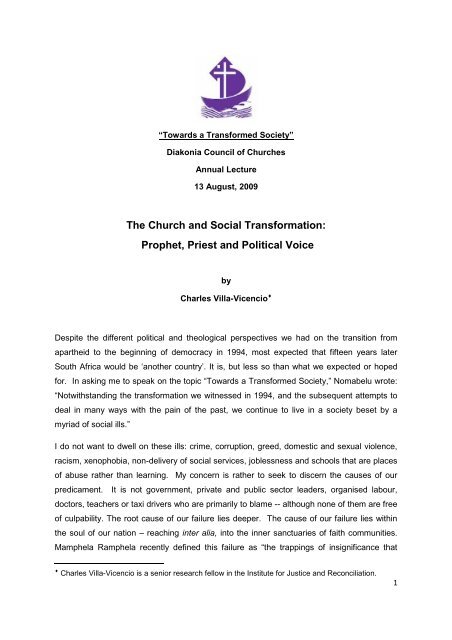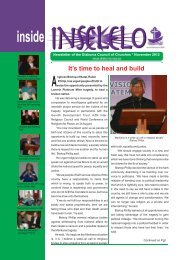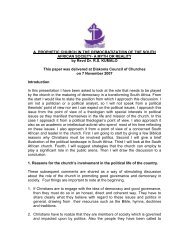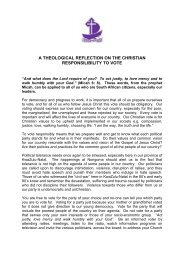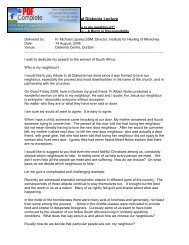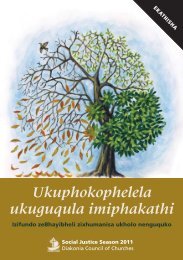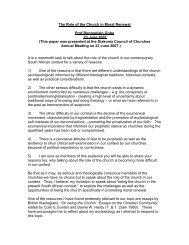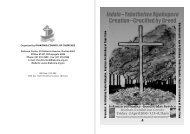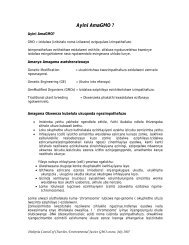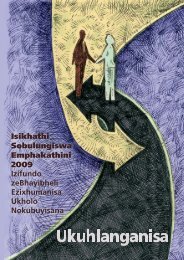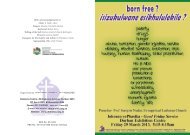The Church and Social Transformation - Diakonia Council of Churches
The Church and Social Transformation - Diakonia Council of Churches
The Church and Social Transformation - Diakonia Council of Churches
You also want an ePaper? Increase the reach of your titles
YUMPU automatically turns print PDFs into web optimized ePapers that Google loves.
“Towards a Transformed Society”<br />
<strong>Diakonia</strong> <strong>Council</strong> <strong>of</strong> <strong>Church</strong>es<br />
Annual Lecture<br />
13 August, 2009<br />
<strong>The</strong> <strong>Church</strong> <strong>and</strong> <strong>Social</strong> <strong>Transformation</strong>:<br />
Prophet, Priest <strong>and</strong> Political Voice<br />
by<br />
Charles Villa-Vicencio <br />
Despite the different political <strong>and</strong> theological perspectives we had on the transition from<br />
apartheid to the beginning <strong>of</strong> democracy in 1994, most expected that fifteen years later<br />
South Africa would be ‘another country’. It is, but less so than what we expected or hoped<br />
for. In asking me to speak on the topic “Towards a Transformed Society,” Nomabelu wrote:<br />
“Notwithst<strong>and</strong>ing the transformation we witnessed in 1994, <strong>and</strong> the subsequent attempts to<br />
deal in many ways with the pain <strong>of</strong> the past, we continue to live in a society beset by a<br />
myriad <strong>of</strong> social ills.”<br />
I do not want to dwell on these ills: crime, corruption, greed, domestic <strong>and</strong> sexual violence,<br />
racism, xenophobia, non-delivery <strong>of</strong> social services, joblessness <strong>and</strong> schools that are places<br />
<strong>of</strong> abuse rather than learning. My concern is rather to seek to discern the causes <strong>of</strong> our<br />
predicament. It is not government, private <strong>and</strong> public sector leaders, organised labour,<br />
doctors, teachers or taxi drivers who are primarily to blame -- although none <strong>of</strong> them are free<br />
<strong>of</strong> culpability. <strong>The</strong> root cause <strong>of</strong> our failure lies deeper. <strong>The</strong> cause <strong>of</strong> our failure lies within<br />
the soul <strong>of</strong> our nation – reaching inter alia, into the inner sanctuaries <strong>of</strong> faith communities.<br />
Mamphela Ramphela recently defined this failure as “the trappings <strong>of</strong> insignificance that<br />
Charles Villa-Vicencio is a senior research fellow in the Institute for Justice <strong>and</strong> Reconciliation.<br />
1
citizens <strong>of</strong> South Africa have failed to cast <strong>of</strong>f <strong>and</strong> to break free from.” 1 It has to do with a<br />
sense <strong>of</strong> powerlessness within ourselves to change what we know is wrong.<br />
Reflecting sometime ago on the failures <strong>of</strong> the African continent as a whole, former president<br />
Nelson M<strong>and</strong>ela observed:<br />
<strong>The</strong> fault is not in our stars but in ourselves … We know that we have it in<br />
ourselves, as Africans, to change all this. We must assert our will to do so.<br />
We must say that there is no obstacle big enough to stop us from bringing<br />
about an African renaissance. 2<br />
<strong>The</strong> question I pose concerns the role <strong>of</strong> the church <strong>and</strong> other faith communities in<br />
overcoming insignificance by taking some responsibility for the spiritual <strong>and</strong> social<br />
transformation which the nation dem<strong>and</strong>s. I do so with some hesitation because <strong>of</strong> my own<br />
limited involvement in the institutional church in recent times. We all, however, have a<br />
responsibility to concern ourselves with the RDP <strong>of</strong> the soul<br />
Recognising that I am addressing the <strong>Diakonia</strong> <strong>Council</strong> <strong>of</strong> <strong>Church</strong>es I have chosen to speak<br />
on the prophetic <strong>and</strong> priestly roles <strong>of</strong> the church in relation to its political responsibility in the<br />
promotion <strong>of</strong> social transformation, conscious that members <strong>of</strong> other faiths will need to do<br />
their hermeneutics in adapting what I have to say to their own traditions.<br />
Depending on the context within which we find ourselves at any given time the inclination<br />
<strong>and</strong> perhaps the obligation <strong>of</strong> church, mosque, synagogue <strong>and</strong> temple is to lean towards one<br />
<strong>of</strong> these roles. Careful reflection, however, suggests the need for faith communities to play a<br />
holistic or integrated role in society, incorporating the role <strong>of</strong> priest <strong>and</strong> prophet, plus political<br />
counsellor, in a holistic paradigm <strong>of</strong> ministry. <strong>The</strong> one feeds <strong>of</strong>f the other.<br />
A word about each <strong>of</strong> these three roles:<br />
Prophet<br />
<strong>The</strong>re is perhaps something <strong>of</strong> a prophet is most <strong>of</strong> us – not least in the face <strong>of</strong> human<br />
abuse <strong>and</strong> suffering. Righteous anger, a sense <strong>of</strong> fair play <strong>and</strong> protest against unnecessary<br />
suffering are involuntary emotions that well-up in people <strong>of</strong> conscience <strong>and</strong> good will in the<br />
face <strong>of</strong> abuse. When the Pharisees rebuked Jesus’ disciples for their proclamations, Jesus<br />
suggested that in certain situations if they were to be silent the “very stones would cry out.”<br />
1 Mamphela Ramphela, “A Lack <strong>of</strong> Confidence is the Barrier to SA’s Success,” Sunday Independent,<br />
12 July 2009.<br />
2 Nelson M<strong>and</strong>ela, Long Walk to Freedom (London: Little, Brown, 1994).<br />
2
(Luke 19:40) Indeed, the Hebrew Bible tells us that even the donkey rises up to speak truth<br />
to the one who beats it! (Numbers 22: 28)<br />
<strong>The</strong> prophet is compelled to proclaim justice <strong>and</strong> the word <strong>of</strong> the Lord in the face <strong>of</strong> injustice,<br />
whereas many people, even those who recognise evil for what it is, prefer to hold their<br />
tongues in the face <strong>of</strong> evil out <strong>of</strong> self-interest, in the hope <strong>of</strong> securing a good job or out <strong>of</strong><br />
fear. When this level <strong>of</strong> silence prevails, an extra burden is placed on the few to speak on<br />
behalf <strong>of</strong> the many. We think <strong>of</strong> people <strong>of</strong> faith who walked among us as prophets<br />
proclaiming justice in the face <strong>of</strong> evil. Albert Luthuli, Robert Sobukwe, Beyers Naude, Denis<br />
Hurley, Archbishop Tutu, Imam Heron, Albertina Sisulu, Emma Mashinini, Ela Gh<strong>and</strong>i, <strong>and</strong><br />
others. <strong>The</strong>re were also prophets who located themselves outside <strong>of</strong> the faith communities:<br />
Joe Slovo, Ruth First, Helen Joseph <strong>and</strong> others – each deeply reflective <strong>and</strong> in their own<br />
way pr<strong>of</strong>oundly spiritual people.<br />
<strong>The</strong>re are also prophetic movements – not led by an obvious individual person but a<br />
collective or movement <strong>of</strong> people proclaiming the judgement <strong>of</strong> God <strong>and</strong> <strong>of</strong> history in the<br />
name <strong>of</strong> moral decency. Trade unions, organisations <strong>of</strong> women, marginalised groups <strong>of</strong><br />
young people are among them. Faith movements, including the <strong>Diakonia</strong> <strong>Council</strong> <strong>of</strong><br />
<strong>Church</strong>es, the SACC, the Christian Institute, Jews for Justice, the Union <strong>of</strong> Jewish Women,<br />
the Muslim Youth Movement, <strong>and</strong> the Divine Life Society have all in various situations raised<br />
their voices <strong>and</strong> contributed in kind to the needs <strong>of</strong> marginalised people.<br />
<strong>The</strong> prophetic voice has come at times from the most unlikely places <strong>and</strong> <strong>of</strong>ten from the<br />
most unlikable individuals <strong>and</strong> movements. Biblical prophets were rarely a likeable lot <strong>and</strong><br />
frequently on the wrong side <strong>of</strong> rulers <strong>and</strong> the elite. I had a conversation with a ‘prophet<br />
turned politician’ in Pretoria a while ago. He complained about a particular clergyman who<br />
was criticising government for failing to address a particular problem. He spoke <strong>of</strong> the<br />
clergyman as being naïve <strong>and</strong> unrealistic. Prophets are sometimes that! When, however,<br />
the prophetic voice <strong>of</strong> leaders, both responsible <strong>and</strong> at times naïve, are shunned <strong>and</strong><br />
ignored, the temptation is for those who we used to call “opstookers <strong>and</strong> klipgooiers”<br />
(instigators <strong>and</strong> stone-throwers) to take to the streets. We would that they find constructive<br />
<strong>and</strong> non-violent ways <strong>of</strong> making their protest. Should we ignore their cry <strong>and</strong> fail to respond<br />
to their need, however, we are likely to do so at our own peril.<br />
Thank God for the prophets <strong>and</strong> those who toll the bell <strong>of</strong> injustice <strong>and</strong> human suffering.<br />
Some who raise their voices <strong>and</strong> pay the price for so doing are celebrated as heroes<br />
(especially the dead ones!), many continue to do so without honour, recognition or respect.<br />
3
We would do well to listen <strong>and</strong> ponder the voices that surround us, lest we fail to hear a word<br />
<strong>of</strong> warning, indeed what some who believe would call the Word <strong>of</strong> the Lord.<br />
In addition to the important voice <strong>of</strong> the prophet proclaiming the Word <strong>of</strong> the Lord, whether in<br />
brimstone <strong>and</strong> damnation or graceful provocation, the citizens <strong>of</strong> our l<strong>and</strong> also need<br />
assistance <strong>and</strong> support to rise above any sense <strong>of</strong> insignificance <strong>and</strong> powerless they may<br />
feel in the face <strong>of</strong> evil. For this to happen transformation in this fifteenth year <strong>of</strong> our<br />
democracy, the prophetic voice needs to be augmented with the voice <strong>of</strong> the pastor or priest<br />
– one who st<strong>and</strong>s beside wayward citizens, parishioners <strong>and</strong> sinners, enabling them to<br />
become more than what they may be at any given time.<br />
Priest<br />
As prophets come in various shapes <strong>and</strong> sizes, <strong>and</strong> without making too finer a theological<br />
distinction between priest <strong>and</strong> pastor, the latter also comes in different guises. I was<br />
recently speaking with the South African ambassador to Sweden Zeph Makgetla, an old<br />
struggle type, about our native l<strong>and</strong>. He said that if he were President he would deploy 10<br />
000 additional psychologists across the l<strong>and</strong>, suggesting that we are a broken <strong>and</strong><br />
traumatised people!<br />
For many years the church was called to be a prophetic church. We were schooled in the<br />
need to say a resounding ‘no’ to the apartheid state. Today we are required to continue to<br />
say ‘no’ to all forms <strong>of</strong> oppression, corruption <strong>and</strong> deception by government <strong>and</strong> citizens<br />
alike. We are also called to say ‘yes’ <strong>and</strong> ‘well, maybe’ to programmes <strong>of</strong> government <strong>and</strong><br />
others that <strong>of</strong>fer hope <strong>and</strong> transformation in society. Above all we need to <strong>of</strong>fer healing,<br />
inspiration <strong>and</strong> innovation to a nation that in its better moments knows its shortcomings.<br />
<strong>The</strong> prophet is inspired to speak in times <strong>of</strong> crisis <strong>and</strong> when the need is most urgent. <strong>The</strong>ir<br />
names <strong>of</strong>ten hit the media headlines. <strong>The</strong> parish priest, pastor <strong>and</strong> preacher are required to<br />
minister in good times <strong>and</strong> bad, whether inspired or not – <strong>and</strong> mostly their voices are do not<br />
makes the headlines. Above all the pastor <strong>and</strong> priest is required to care for both ‘those who<br />
will’ <strong>and</strong> ‘those who won’t’ reach beyond themselves to the higher goals dem<strong>and</strong>ed <strong>of</strong> South<br />
Africa in this difficult period <strong>of</strong> our history.<br />
This requires the church to <strong>of</strong>fer more than critical analysis, more than a litany <strong>of</strong> society’s<br />
shortcomings, more than a loud voice from the pulpit. <strong>The</strong> church needs also to demonstrate<br />
an underst<strong>and</strong>ing <strong>of</strong> the fears <strong>of</strong> those who languish in their comfort zones or fear what the<br />
future holds for their old age, their children <strong>and</strong> their children’s children. In addition to the<br />
prophetic word, intransigence <strong>of</strong>ten requires a pastoral touch to help people attain their own<br />
4
liberation <strong>and</strong> involvement in the transformation process. Sometimes the prophetic voice <strong>of</strong><br />
censure is required. “Woe unto you Scribes <strong>and</strong> Pharisees, hypocrites” was spoken by the<br />
one who incarnated tenderness. In other situations, however, the harsh words <strong>of</strong> judgment<br />
need to be augmented by the language <strong>of</strong> underst<strong>and</strong>ing <strong>and</strong> inspiration. Words <strong>of</strong><br />
aspiration that lure <strong>and</strong> draw people towards their better <strong>and</strong> higher ideals are <strong>of</strong>ten needed<br />
in the most adverse situations. <strong>The</strong>re was an old lady in the Buitenkant Street congregation<br />
in District Six that I served thirty years ago in my days <strong>of</strong> anger <strong>and</strong> dem<strong>and</strong>, who used to<br />
say “you can catch more flies with honey than with vinegar.” Important words.<br />
I go back to the days when I taught liberation <strong>and</strong> contextual theology. I understood the<br />
prophetic dimension inherent to that theology. It provided a relatively easy albeit costly<br />
incentive. I was at the same time fascinated by the depth <strong>of</strong> spiritual <strong>and</strong> liturgical praxis out<br />
<strong>of</strong> which this theology came. It is the latter that I fear has to a significant extent lost in parts<br />
<strong>of</strong> the church where it was once present, not least comfortable middle class churches, where<br />
we so <strong>of</strong>ten fail to promote the kind <strong>of</strong> priestly theology that gives rise to a prophetic <strong>and</strong><br />
diakonic ministry.<br />
<strong>The</strong> burning question in our present context is how to build a church <strong>and</strong> a nation from a<br />
range <strong>of</strong> people drawn from different ideologies, races, backgrounds, classes <strong>and</strong> historic<br />
experiences. This includes people who by design or accident were on opposite sides <strong>of</strong> a<br />
deeply divided nation. I spoke with Govan Mbeki a couple <strong>of</strong> years before he died in 2001,<br />
asking what it would take to ensure the success <strong>of</strong> a democratic South Africa. His answer<br />
was crisp <strong>and</strong> clear: “having <strong>and</strong> belonging”. He suggested that unless the “have not’s” are<br />
able to share in the material wellbeing <strong>of</strong> the nation those who “have” will not sleep well at<br />
night. We went on to say that unless those who “have” are in turn to made to feel part <strong>of</strong> the<br />
South African family they will resist sharing what they have with others. He was speaking<br />
about the prophetic need to share <strong>and</strong> the priestly need to reconcile.<br />
It will take the cultivation <strong>of</strong> a generosity <strong>of</strong> the human spirit by blacks <strong>and</strong> whites, rich <strong>and</strong><br />
the poor in South Africa for Oom Gov’s vision to be realised. If his word is correct -- <strong>and</strong> it<br />
does not take the Wisdom <strong>of</strong> Solomon to realise it is -- the question is to what extent are our<br />
churches, mosques, temples <strong>and</strong> synagogues challenging (prophetically) <strong>and</strong> enabling<br />
(pastorally) their congregants to realise this double-edged vision. It is a vision that draws the<br />
prophetic <strong>and</strong> the priestly into a common form <strong>of</strong> ministry.<br />
5
Political Voice<br />
What do the prophet <strong>and</strong> the priest have to say to government <strong>and</strong> state? What is the<br />
political responsibility <strong>of</strong> faith communities in this regard? <strong>The</strong> prophet needs to speak truth<br />
to power. <strong>The</strong> priest needs to nurture souls <strong>and</strong> liberate all South Africans (not only the nice<br />
ones) <strong>of</strong> their anxieties, fears <strong>and</strong> self-centeredness. <strong>The</strong> prophet <strong>and</strong> the priest needs at<br />
the same time to underst<strong>and</strong> the limitations within which the politician, the leader <strong>and</strong> state is<br />
obliged to operate.<br />
I am suggesting that in being both prophetic <strong>and</strong> priestly, <strong>of</strong>ten to the annoyance <strong>of</strong> those to<br />
whom the church ministers, the church needs to be more than the purveyor <strong>of</strong> what the<br />
‘prophet-turned-politician’ (to whom I referred earlier) saw as ‘naïve <strong>and</strong> unrealistic’ niceties<br />
in the face <strong>of</strong> hard political realities. Without surrendering the importance <strong>of</strong> the prophetic<br />
<strong>and</strong> priestly voice, both prophet <strong>and</strong> priest have a responsibility to speak to the real world in<br />
promoting concrete possibilities for resolving <strong>of</strong> the social problems facing the nation. <strong>The</strong><br />
church cannot afford to speak only at the level <strong>of</strong> principle, absolute st<strong>and</strong>ards <strong>and</strong> what<br />
would be nice in an ideal world if it is to promote real transformation. In some such<br />
situations the church has an important mediatory role to play between leaders who <strong>of</strong>ten<br />
tend to dwell on the difficulties involved in promoting a social agenda <strong>and</strong> those who are<br />
dem<strong>and</strong>ing change.<br />
Speaking at the Oxford Conference on Life <strong>and</strong> peace in the 1930s, that gave rise to the<br />
establishment <strong>of</strong> the World <strong>Council</strong> <strong>of</strong> <strong>Church</strong>es, J. H. Oldham spoke <strong>of</strong> the need the church<br />
to develop what he called “middle axioms”. Emphasising that these did not involve the<br />
ultimate step required to resolve a problem, their “middle axioms” were designed to<br />
anticipate “the possible next step” that could reasonably be taken to alleviate a crisis <strong>and</strong><br />
open the way for further steps to be taken later in finding a more sustainable solution to a<br />
problem. 3 This requires the church to engage in down-to-earth, concrete <strong>and</strong> <strong>of</strong>ten a timeconsuming<br />
ministry. <strong>The</strong>re are no quick-fix solutions to many societal problems. This is a<br />
form <strong>of</strong> ministry to the structures <strong>of</strong> government that requires prophets <strong>and</strong> priests to role-up<br />
their sleeves, get dirt under their finder nails <strong>and</strong> be a meaningful player in society.<br />
I would suggest that the biggest challenge facing the churches, at least in some parishes<br />
(recognising that there are some obvious <strong>and</strong> celebratory exceptions) is the lack <strong>of</strong> direct<br />
involvement by parishioners in development <strong>and</strong> aid work as opposed to charitable giving. It<br />
is this that <strong>of</strong>ten distances many priests, would-be prophets <strong>and</strong> parishioners from the harsh<br />
3 See Duncan B. Forrester, Beliefs, Values <strong>and</strong> Policies: Conviction Politics in a Secular Age (Oxford:<br />
Clarendon Press, 1989), 22.<br />
6
ealities <strong>of</strong> what is involved in the promotion <strong>of</strong> the kind <strong>of</strong> realistic policies that politicians,<br />
bureaucrats, civil servants <strong>and</strong> social practitioners face on a daily basis.<br />
Bluntly put, there are people in government, the private sector <strong>and</strong> civil society who are<br />
looking to faith communities to help them weld together moral ideals, practical possibilities<br />
<strong>and</strong> a spiritual incentive to realise their intensions. Political leaders are looking to faith<br />
communities to keep them in touch with the needs <strong>of</strong> grassroots’ communities <strong>and</strong> to provide<br />
the kind <strong>of</strong> spiritual, moral <strong>and</strong> prophetic leadership that is required to move the nation along<br />
the transformation track. <strong>The</strong> nineteenth century philosopher G. W. F. Hegel once argued<br />
that a successful leader needs to be one step ahead <strong>of</strong> his or her people, but never more<br />
than one step. Ahead in order to lead; not too far ahead in order to ensure he or she<br />
underst<strong>and</strong>s <strong>and</strong> gives expression to the needs <strong>of</strong> the community. It is this leadership that<br />
faith communities need to <strong>of</strong>fer.<br />
Towards a Holistic Ministry<br />
Some are called to be prophets, some to be priests <strong>and</strong> pastors, others politicians <strong>and</strong> civil<br />
servants. <strong>The</strong> question is how to ensure that the one enriches the other. Ministry in this<br />
period <strong>of</strong> our history as a nation involves finding a way to integrate the roles <strong>of</strong> prophet,<br />
priest <strong>and</strong> political counsel. This, I suggest, is a contribution that faith-based spirituality can<br />
make to realistic transformation <strong>and</strong> the burning need for a nation to rise above what is<br />
sometimes a sense <strong>of</strong> insignificance <strong>and</strong> powerlessness in the face <strong>of</strong> the challenges that<br />
confront us. This is a challenge every bit as dem<strong>and</strong>ing as the challenge we faced in the<br />
struggle against apartheid. <strong>The</strong> transformation challenge is a huge one, an urgent one <strong>and</strong><br />
clock is ticking.<br />
7


